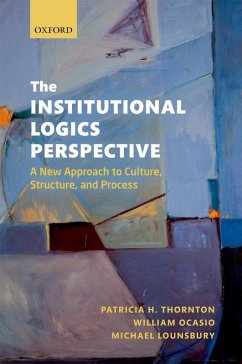How do institutions influence and shape cognition and action in individuals and organizations, and how are they in turn shaped by them? Various social science disciplines have offered a range of theories and perspectives to provide answers to this question. Within organization studies in recent years, several scholars have developed the institutional logics perspective. An institutional logic is the set of material practices and symbolic systems including assumptions, values, and beliefs by which individuals and organizations provide meaning to their daily activity, organize time and space, and reproduce their lives and experiences. This approach affords significant insights, methodologies, and research tools, to analyze the multiple combinations of factors that may determine cognition, behaviour, and rationalities. In tracing the development of the institutional logics perspective from earlier institutional theory, the book analyzes seminal research, illustrating how and why influential works on institutional theory motivated a distinct new approach to scholarship on institutional logics. The book shows how the institutional logics perspective transforms institutional theory. It presents novel theory, further elaborates the institutional logics perspective, and forges new linkages to key literatures on practice, identity, and social and cognitive psychology. It develops the microfoundations of institutional logics and institutional entrepreneurship, proposing a set of mechanisms that go beyond meta-theory, integrating this work with macro theory on institutional logics into a cross-levels model of cultural heterogeneity. By incorporating current psychological understanding of human behaviour and linking it to sociological perspectives, it aims to provide an encompassing framework for institutional analysis, and to be an essential and accessible reference for scholars and advanced students of organizational behaviour, organization and management theory, business strategy, and cultural sociology.
Dieser Download kann aus rechtlichen Gründen nur mit Rechnungsadresse in A, B, BG, CY, CZ, D, DK, EW, E, FIN, F, GR, HR, H, IRL, I, LT, L, LR, M, NL, PL, P, R, S, SLO, SK ausgeliefert werden.









